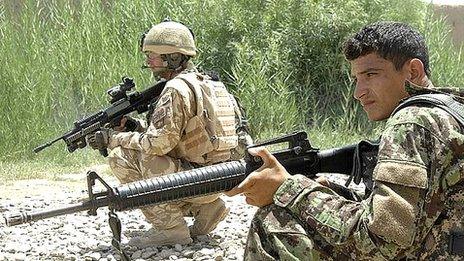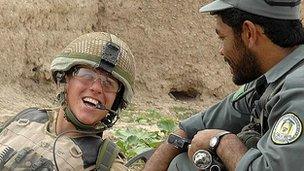Afghanistan conflict: Rogue soldiers 'eroding morale'
- Published

International and Afghan troops must work together and let their guard down
After an Afghan National Army lieutenant shot dead a British soldier and Royal Marine, injuring a third serviceman, the spotlight has fallen on relations between international and Afghan troops.
For a soldier there is nothing worse than facing the prospect of death at the hands of men in uniform supposedly on their own side.
It is a threat of a different order from other risks they face, such as the occupational hazards of death in conflict or by accident.
That is why the growing number of incidents of foreign troops being shot by Afghan police or soldiers is so corrosive, and threatens morale.
"Although the attacks are relatively few in number, the effect that they have is severe," the senior Nato civilian representative in Afghanistan, Sir Simon Gass, told the BBC.
Shot while asleep
Some things can be done to mitigate the risk. Afghan officers are far better than they were, and monitor their soldiers.
They are now trained to talk to soldiers when they come back from leave to see whether they might have faced undue pressure from the Taliban or others.
But not all officers are good.
The man who shot dead two British soldiers in Lashkar Gah on Monday was an Afghan Army lieutenant.
However much training they have, international and Afghan troops need to work together, and that means letting their guard down, and removing their body armour.
Some of those killed recently were shot when they were asleep, making it even harder to trust the Afghans they are training and supporting.
There is no evidence that the attacks are part of a Taliban strategy, although investigations have shown that many of the killers had false identity papers.
Trust has to be a two-way street, and British soldiers have seen incidents which have turned them against the Afghan troops they live among.
Stories of Afghan troops keeping boys for sexual purposes, and shooting prisoners, have worsened relations between the two sides.
Hatred 'growing rapidly'
An internal US army survey of relations between US and Afghan troops in eastern Afghanistan,obtained by the New York Times,, externalpainted a bleak picture. It ran contrary to the official line that these attacks are the work of lone individuals with a grudge.
An Afghan colonel is quoted in the report as saying: "The sense of hatred is growing rapidly."

British troops have had intensive training to improve cultural awareness
He described his own troops as "thieves, liars and drug addicts". But for their part, the US soldiers are "rude, arrogant bullies who use foul language".
British troops have had far more intensive training in recent years to improve cultural awareness, to assist them to cope with the environment of Afghanistan, and to not inadvertently offend Afghan soldiers.
I have witnessed mock meetings of Afghan village elders - shuras - held near herds of bemused cattle on Salisbury Plain.
And I have heard British officers sometimes compare Afghan enmity with known British rivalry between communities, or football teams, in an effort to increase understanding.
But soldiers are not social workers, and there is a limit to how much can be done if trust breaks down.
There is a war-weariness among Afghan troops and civilians in their country's long conflict.
And the fact remains that more civilians have been killed by one rogue US soldier this year than foreign soldiers who have died at the hands of Afghan troops.
- Published26 March 2012
- Published12 March 2012
- Published9 March 2012
- Published3 March 2012
- Published21 October 2011
- Published28 July 2011